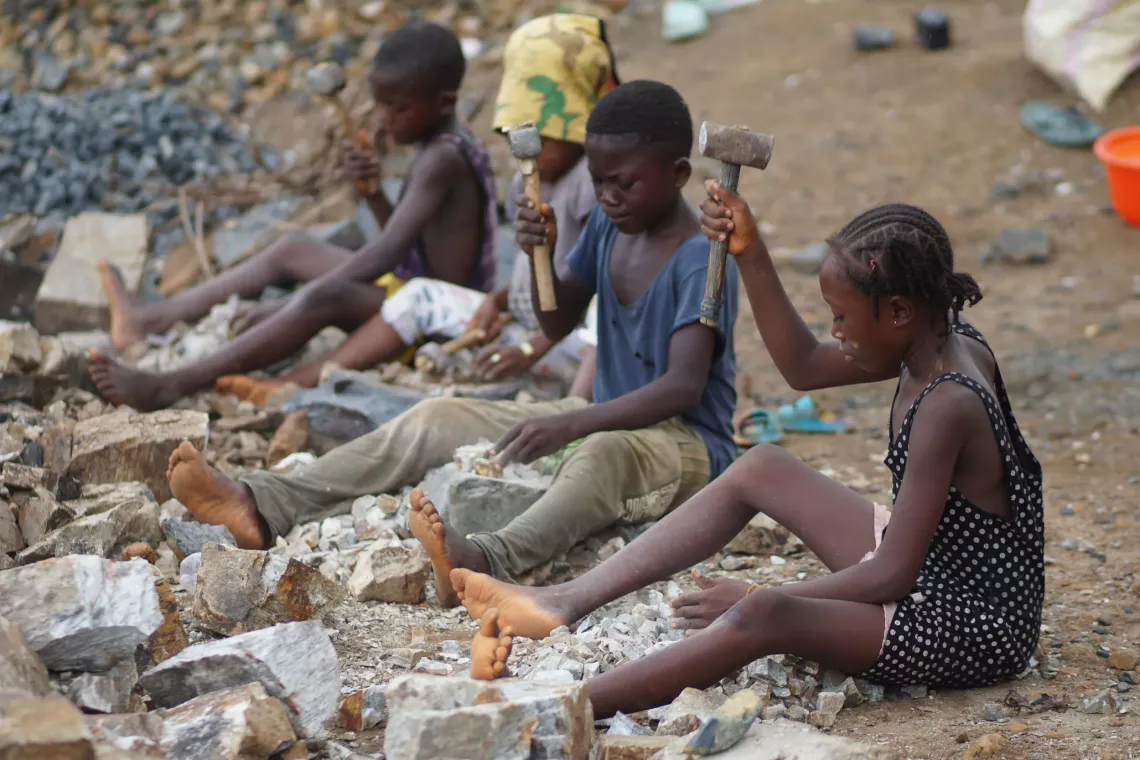In this story, Clark Merrefield interviews the Reuters team that exposed the use of migrant child labor by companies in the US South — an investigation that was one of six finalists for the prize.
The story was published by The Journalist’s Resource and is republished with permission. The winner of this year’s prize was Anna Wolfe of Mississippi Today, for uncovering a major welfare funding scandal involving a former governor and a superstar athlete.
In February 2022, Reuters published the first story in what would become a three-part series exposing the use of migrant child labor in chicken and auto plants in the southern US state of Alabama.
The children, some as young as 12, were often working with dangerous machinery that put their lives at risk, found reporters Joshua Schneyer, Mica Rosenberg, and Kristina Cooke. Part one, which came about with a tip from a longtime source of Cooke’s, tells the story of child labor in one US town by focusing on a 16-year-old migrant from Guatemala working in a chicken plant in Enterprise, Alabama.
“US poultry plants, hungry for labor, rely on migrant workers and staffing agencies to fill jobs,” the reporters write. “With migration soaring from Central America, some minors are making their way into that pipeline.” There was a huge amount of shoe-leather reporting, which included knocking on doors at trailer parks, apartments, schools, churches, employment agencies, sheriff’s offices, and town halls.
After that story was published, the reporters started receiving more tips. Those sources told the reporters that the problem of child labor went beyond chicken plants in rural Alabama — that they should look into the auto industry, too.
Parts two and three of the series, published in July and December, expose the existence of child workers at four parts makers in Alabama, supplying Hyundai Motor Co. and sister company Kia Corp. One of those parts suppliers, SMART Alabama, was a direct subsidiary of Hyundai.
“After reviewing company documents and other source material that we found, we were able to figure out that that [supplier] was actually a directly-owned subsidiary of Hyundai,” Schneyer says. “This is where the alarm bells went off for us. We were like, oh, OK, wait a minute. It’s Hyundai. Kids are working for Hyundai. They are assembling parts for some of the most popular cars and SUVs sold to American consumers. This is the third biggest auto manufacturer in the country.”
While other news outlets also reported on the disturbing practice of large firms using child workers in dangerous work conditions, the Reuters investigation offered unprecedented detail and personal stories.
Weeks after the Reuters report on the Hyundai suppliers, federal and state officials made a surprise visit to one Alabama supplier and found seven underage workers. A class action suit brought by customers soon followed. The administration of US President Joe Biden recently announced it will investigate child labor abuses through an interagency task force, following the reports from Reuters and others. Also in recent weeks, Hyundai told shareholders it would divest from the parts subsidiary Reuters identified as using child labor.
For all parts of the series, the reporters contacted a wide variety of potential sources, to capture a range of voices and perspectives. These included workers and their families, plant managers, schools, nonprofit groups working on behalf of migrants, colleagues at Reuters, and other experts who understand the intricacies of auto industry supply chains.
There was a huge amount of shoe-leather reporting, which included knocking on doors at trailer parks, apartments, schools, churches, employment agencies, sheriff’s offices, and town halls. In the end, the reporting team interviewed more than 100 migrant workers. They learned about how regional auto supply chains worked by building databases from thousands of pages of corporate documents, police records, immigration documents, industrial accident reports, and court transcripts.
The reporters were especially sensitive to the reality that they were often interviewing minors and others vulnerable to deportation who were reluctant to speak on the record.
In some cases, underage children came to the US for the purpose of securing jobs that would pay far more than what they could make in their home countries, in order to help financially support their families.
“They’re in a conundrum,” Rosenberg says. “They’re living in very desperate situations a lot of times. Kids at very young ages in Guatemala are picking in the coffee fields and working in sugar plantations in very dangerous situations. And a lot of the people we talked to here had that conception of, ‘Look, we came here to make money and we’re doing everything that we can.’ I think that’s part of the reason why we really wanted to focus on the companies and put the onus on their practices.”
We spoke with Schneyer, Rosenberg, and Cooke to gather specific insights for other journalists who want to explore illegal labor practices in their coverage areas.
1. Look for Unexpected Data Spikes — They May Hint at an Underlying Story
A longtime source told Cooke in mid-2021 that officials noticed a jump in the number of unaccompanied migrant children being released into the area near Enterprise, Alabama.
The source said those children might be in danger of being trafficked or otherwise exploited. “That kind of piqued our interest,” Cooke says.
She checked data from the US Office for Refugee Resettlement, which keeps tabs on the counties where migrant children are released, usually to family members. It was clear that the Enterprise area had quickly become a hotspot for the resettlement of unaccompanied migrant children.
The next step was figuring out nonprofit groups and others in this rural community that work with migrants.
“There was a small universe of people we tried to reach out to, but we’re casting, at the same time, a very wide net: groups that help immigrants, but also schools, also people who knew the lay of the land,” Rosenberg says. “We found out there were a lot of chicken processing plants and that was, through sources, that was one locus of concern.”
2. Create a Simple Database of How Complex Systems Work When tracking child labor abuses in the American South
“This turned into a business investigation of Hyundai and its supply chain in a very kind of organic way.” — Reuters investigative reporter Joshua Schneyer
For the auto-related stories, the first challenge was figuring out where local suppliers of parts were located and how they fed the primary manufacturing plants in the region.
They found a universe of third-party labor contractors, some with overlapping ownership of companies that would quickly form and dissolve.
“We did a lot of work looking at Alabama business records, Georgia business records,” Rosenberg says.
As they began to understand the regional supply chains and interviewed people involved, such as the labor contractors, they built an Excel spreadsheet showing the connections from local employment agencies up to suppliers for major manufacturing plants.
“This turned into a business investigation of Hyundai and its supply chain in a very kind of organic way,” Schneyer says. “We didn’t set out to write about Hyundai. This was a mystery about, ‘Hey, what’s happening to these kids who are ending up in Alabama? What’s going on?’ And it was only after that first chicken story that we got an explosive tip that there were many kids found working in rural auto parts plants.”
3. Remember That Building Trust Takes Commitment and Protecting Sources is Essential to Responsible Reporting
Migrants and migrant children working in the US have a lot on the line. As the Reuters reporters recount in their series, migrants often owe tens of thousands of dollars to smugglers at exorbitant interest rates. They are trying to maintain employment in the US for wages that would take them weeks or months to earn in their home countries.
In the lede to part one of the series, filed from Enterprise, the reporters write:
“At age 16, when most kids in the United States are halfway through high school, Amelia Domingo found herself working on chicken processing machines in this farm town and deep in debt to loan sharks in her native Guatemala. After borrowing $10,000 for smugglers to get her through Mexico, Amelia crossed into Arizona last February and turned herself over to immigration officials.”
Amelia was released to her sister in Alabama and began working in a chicken plant. The reporters agreed to not use her full name, identify her hometown in Guatemala, or use pictures showing her face or her sister’s face. The prior work of building trust with local groups who work with migrants paid off in Amelia agreeing to share her story.
“That community outreach was also helpful because we had made some trusted sources who were connected to her who helped make the introduction,” says Rosenberg. “So we were able to build on relationships that were already made to help gain some of her trust in that way.”
Being there, on the ground where people live and work, is critical to building trust.
“You have to go show your face,” Cooke says. “You know, let them see who you are, that you’re not some faceless government bureaucrat, that you’re a real person. You’re a reporter, and you’ve made this extra trip to come and see them and hear their story, face-to-face.”
4. Use Social Media to Coordinate and Prioritize Reporting Efforts
When interviewing people who work shift schedules… be prepared to do the same.
The reporters used social media to find sources key to their child labor investigation. They found job recruiters posting and tagging workers on Facebook, which helped the reporters gain a sense of who the recruiters were, what sorts of jobs they were advertising, and which workers they were trying to reach.
The team also used Indeed and LinkedIn to find former and current chicken plant workers, sending personal messages to hundreds of potential sources.
“In one case [Josh] was in Montgomery and I found this recruiter through Indeed,” Cooke says. “We found his address and Josh showed up at his doorstep and was able to interview him. He talked because Josh was there, and he hadn’t been picking up the phone at all.”
5. Meet Sources on Their Schedule, Even If It Means Late Nights or Early Mornings
When interviewing people who work shift schedules, as many food processing and auto plant workers do, be prepared to do the same.
In many cases, meeting workers during the day or early evening proved impossible for the Reuters team.
“They’re working overnight,” Schneyer says. “This was a 24-hour-a-day type of reporting trip where you show up at dawn outside of these plants, or you’re asked to meet people late at night at their trailers or apartments they share with large families.”
Additional Resources
Investigating Immigration: Q&A with Caitlin Dickerson
Forced Labor and Fair Recruitment: A Toolkit for Journalists
Tips for Reporting on Human Trafficking and Forced Labor
Clark Merrefield joined The Journalist’s Resource in 2019 after working as a reporter for Newsweek and The Daily Beast, and as a researcher and editor on three books related to the Great Recession. He was a John Jay College Juvenile Justice Journalism Fellow and his work has been awarded by Investigative Reporters and Editors.
This article first appeared on Global Investigative Journalism Network and is republished here under a Creative Commons license.
You may be interested in reading, “The Threat And Possible Effective Solutions to Latin America’s Foreign Donor Funded Journalism“.
Read more investigative Stories here.
Editor’s note: Each year Harvard’s Shorenstein Center awards the US$25,000 Goldsmith Prize to an investigative project that had a direct impact on government, politics, and policy in the United States, at either the national, state, or local level.



